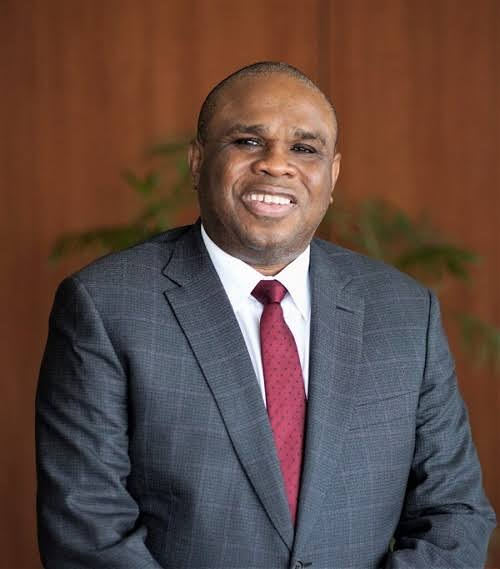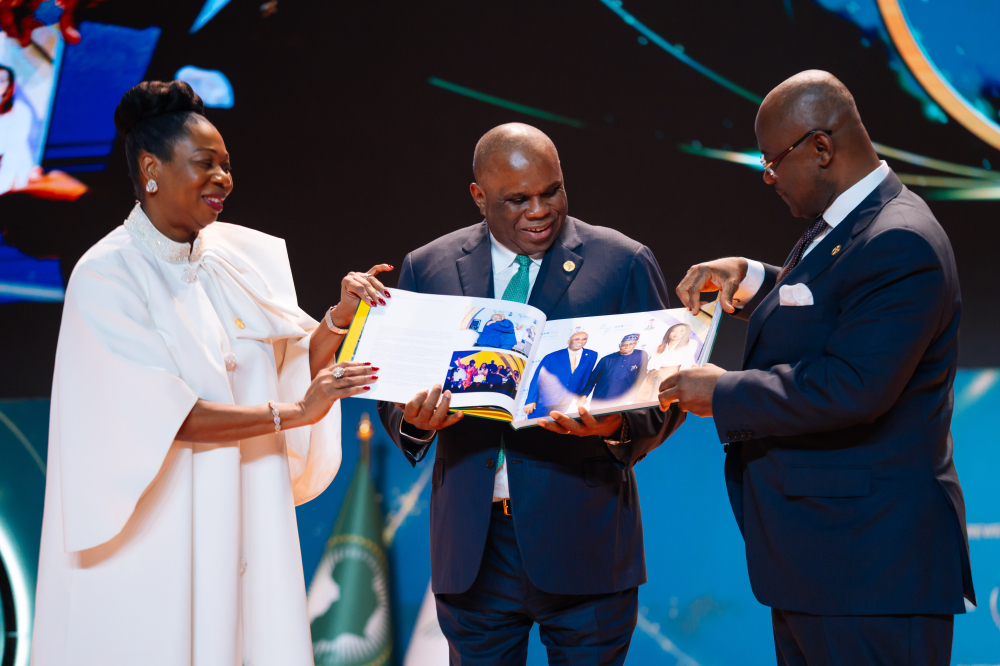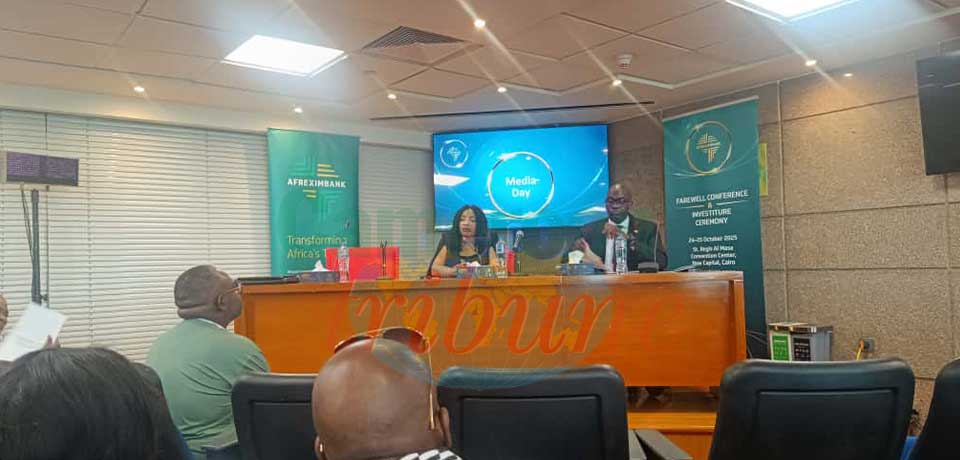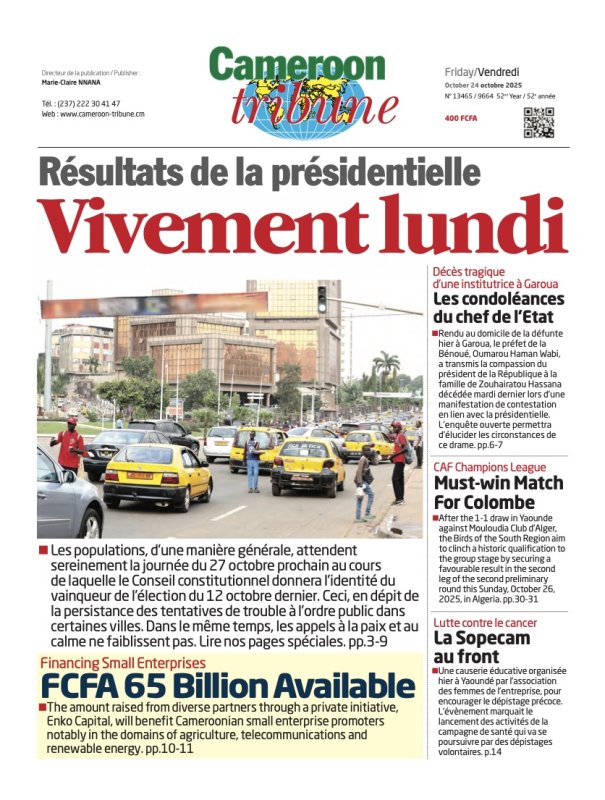« Africa Is The Future Market Of The World »
- Par Junior MATOCK
- 08 Sep 2025 10:33
- 0 Likes

Pr. Benedict Oramah, President and Chairman of the Board of Directors of African Export-Import Bank.
The Intra-African Trade Fair (IATF 2025) is happening at a time when trade is taking centre stage in geopolitics, and the African and global African trade playbook now more than ever needs to be more intentional. I'd like you to speak to how that is shaping the current agenda of the IATF.
Well, I don't know whether trade is taking the centre stage or whether trade is taking the back seat and not taking the centre stage. In a world where it's now becoming fashionable to build up heavy tariff walls and non-tariff barriers, to bring politics so much into trade, and to push back on multilateralism, the political and all the things that everybody thought it could help us achieve are taking the back seat, and I think trade is suffering. But you're also right that trade is taking centre stage, because what is happening is that globalisation is under attack from all angles. There are so many discontents, those who are discontented with globalisation. The blue-collar workers in the West who believe that it has robbed them of the jobs they used to have hooked the middle class in the US and Europe and transferred wealth to Asia and other parts. But people are beginning to say we do things now, more friend-shoring and near-shoring, because other aspects of true politics are coming, and all are drawn from the pushback on globalisation. So, people are no longer people, you know; it's almost like a cold war is back. There are so many sensitivities, and people are beginning to believe that the global supply chain that arose because of globalisation was not the best thing, despite the efficiencies it brought and despite the reduction in global poverty around the world that it brought. They believe it's not the best thing, that it was better to achieve sovereignty than to achieve the other benefits we are talking about. So, they want to produce things in their own country, or near their country, or with their friends. That brings us to global Africa.
When you look at all of those things, those who suffer are the small, open economies. Small, open economies are the big beneficiaries of globalisation, because they specialise in certain things, which, because the production is open to global markets, become large, and people, those who then also begin to see their welfare improve, are drawn by what is happening elsewhere in the world. When you now begin to put up blocks, those small open economies also then begin to suffer. And who are the people who occupy those small, open economies? They are the people of African descent. Why? Because these are the people who were colonised. And the strategy of colonialism was a strategy of divide and conquer. And so, it resulted in the fragmentation of wherever it came from. That's why today in Africa you have 55 countries. You go to the Caribbean, the CARICOM; if I just look at the CARICOM, I know 15 smaller lands, and so on and so forth. And in Africa you go from countries as small as the Seychelles to as big as Nigeria. The impact of what is going on is heaviest and will be even worse on these economies unless there is something about it. So, the only thing we can do about it is to say we are a people that were together before, who were taken to far-flung places of the world, divided by the machinations of colonialism.
Why don't we reverse engineer those things? Why don't we recreate the economy that encompasses the people of African descent? So that others are doing, we can also have our French shoring, we can have our home shoring, we can have our Africa shoring, or whatever you call it. There are 2 billion people of African descent. Estimated $4 trillion of GDP, and that is the estimate. And you have countries, diverse resources, and diverse ecosystems. These are the only parts of the world where you have a population growing at a fast pace. That is where you have the youngest population. That is the future of the world. Because whereas others are ageing, we are getting younger. What that means is that you are the future market. But you have to take advantage of that market. You have to buy from your community. You have to produce in your community. You have to consume what your community produces. So, you have to take off this false – I won't even call it false –misconceived idea that it's only the things produced outside that ecosystem that are the best. And in any case, even if you produce bad things, so be it. I remember when we were kids. We used to have anything that we bought, they said, buy it in China. Because once you touch it, even when they did produce them somewhere else, and they are not good quality, they buy it in China. Today, China is the factory of the world. Even Japan suffers the same thing. My teacher when I was in primary school told me, he said when we were discussing China in those days, he also told me, 'Oh, when Japan was beginning to industrialise, they were also making different goods.' And whatever they produced, the fabric was Japan. Even what they produced and what they didn't produce. It doesn't matter; even if you produce low-quality things, so be it. We are the ones who consume the creative products of the world. We are the ones who consume those things. It's a group of African descent. Because we are the young people. Today, we are in spots. The people of African descent produce the fastest runners. I don't want to talk about the U.S., not even the African Americans.
So, when we have to now look to ourselves, and that's ourselves in all of these things, do we then fold our hands or sit on our palms, see a train coming and wait for a train to run on? I don't think it's the right thing. I think if you look at what is going on here, this is the African trade fair. If you are here on the 5th, you will see a big diaspora day event happening. Attending these events, a very good contingent of people of African descent came from the diaspora. We have the leadership of CARICOM countries here.
I mean, it never happened before. So, those things are beginning to change. And change in a big way. Increasingly, we get integrated. And increasingly, we begin to look after ourselves. And we are now able to engage others. We must engage others. I'm not saying we shouldn't. But we cannot engage meaningfully as fragmented, optimistic countries. We can only engage meaningfully when we come together and become a force. Can you imagine if the U.S. had 50 states? Can you imagine the 50 states coming to you one by one? I think Africa would be all it is today. When the Soviet Union had all those countries in 1920, when they came in 1922, I can't remember exactly. Together we became the Soviet Union. We became powerful. Then when the Soviet Union was broken, of course, Russia became a big country, which was a good thing for them. But it became weaker. The Global African Movement is to give us a platform. Maybe, in fact, the last chance we have to pull ourselves out of the depths of despair that we find ourselves in.
In less than five years, we've seen trade volumes across the continent rise from 3% to 20%, with hundreds of deals signed thanks to the IATF. What three things would you like to see enable AFCFT to reach 50% in the next years to come?
Well, I actually think we've taken the lead in doing some of those things. They're actually out there. It would have been easy for us to say we want to support AfCFTA. We are a bank. We will support it. We will create financing products. Anybody who wants to sell goods from Algeria to Libya, com...
Cet article complet est réservé aux abonnés
Déjà abonné ? Identifiez-vous >
Accédez en illimité à Cameroon Tribune Digital à partir de 26250 FCFA
Je M'abonne1 minute suffit pour vous abonner à Cameroon Tribune Digital !
- Votre numéro spécial cameroon-tribune en version numérique
- Des encarts
- Des appels d'offres exclusives
- D'avant-première (accès 24h avant la publication)
- Des éditions consultables sur tous supports (smartphone, tablettes, PC)














Commentaires